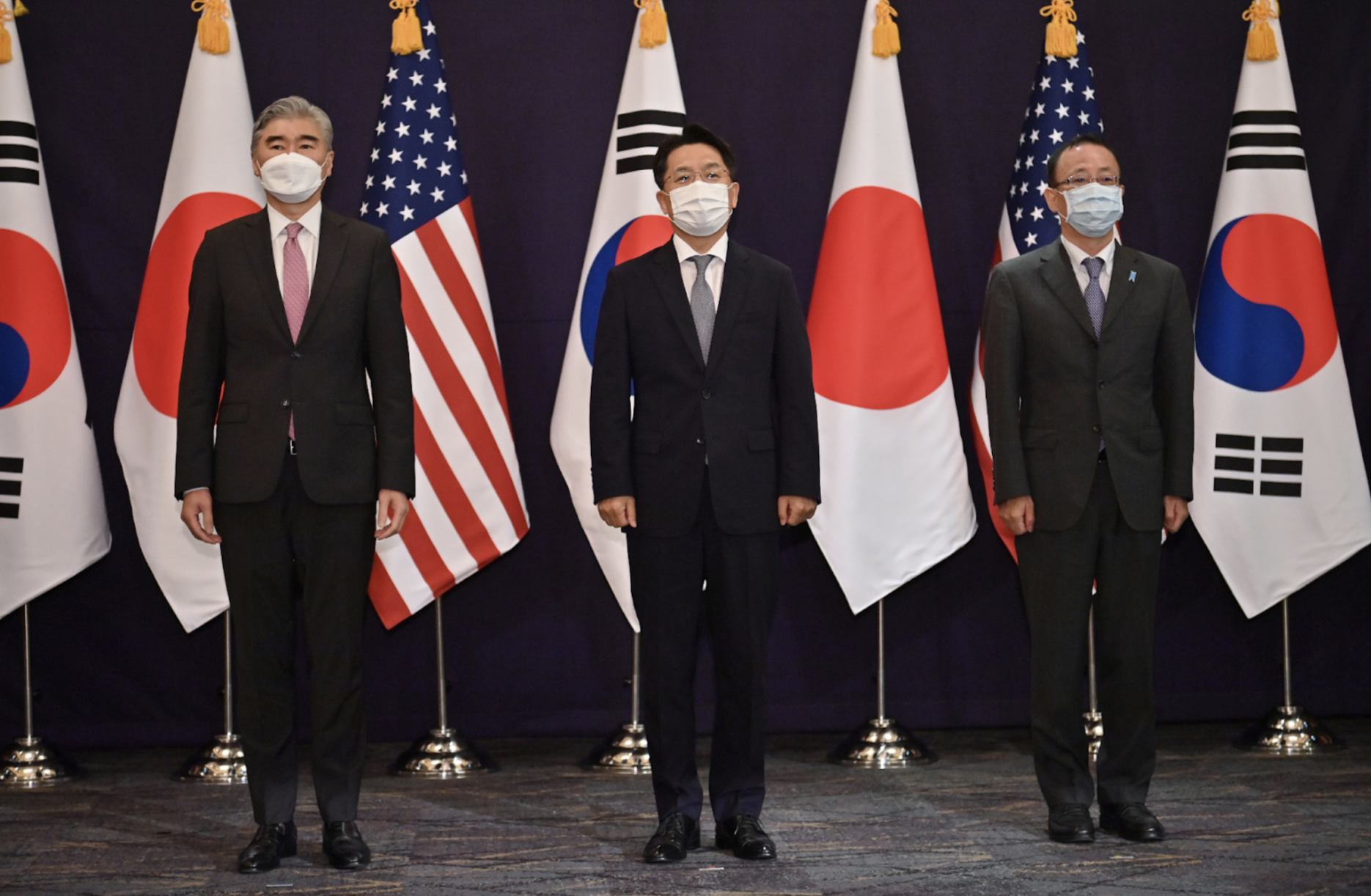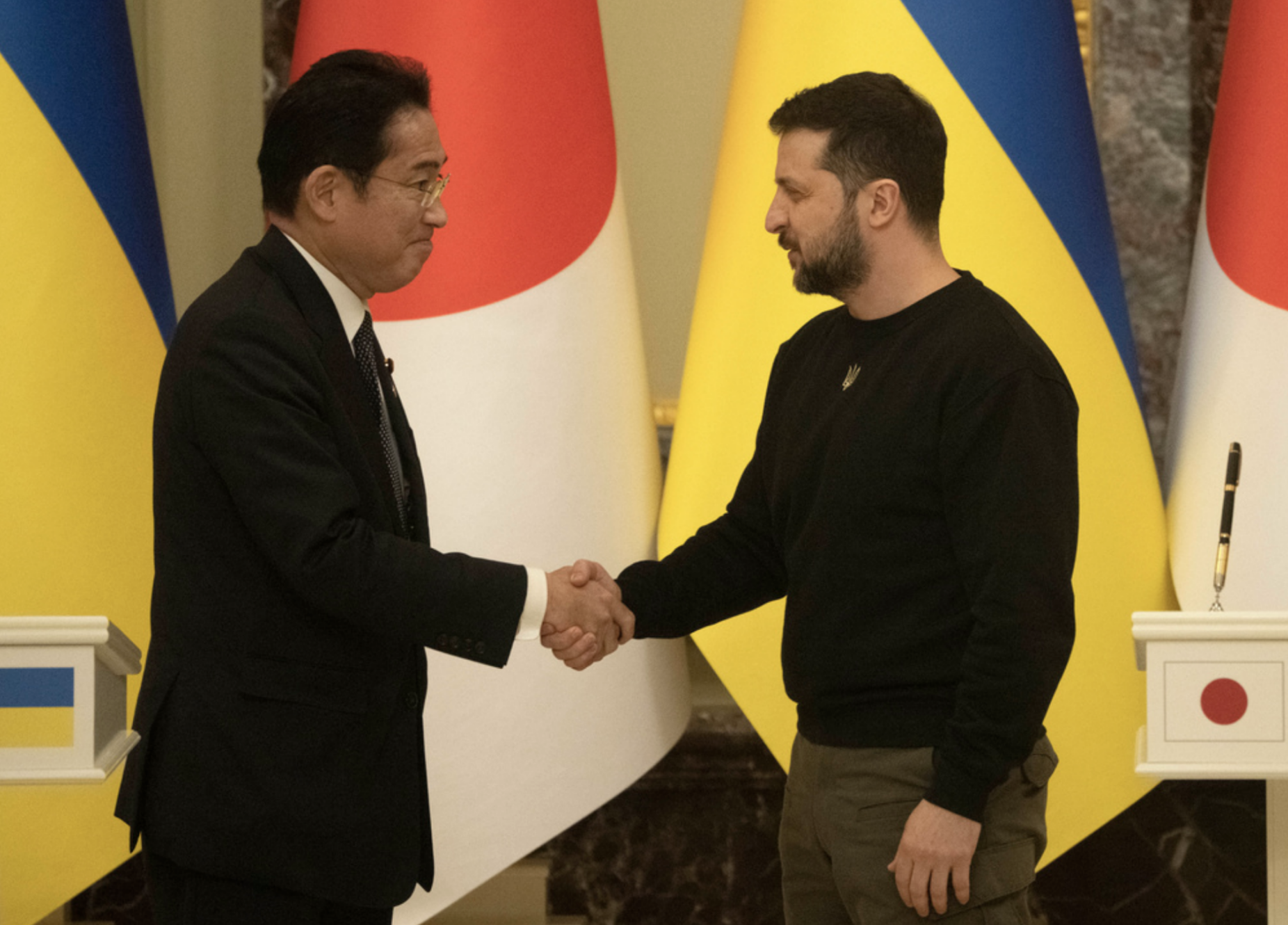The Increasingly Active Foreign Policy of Japan
From left to right, Japanese nuclear envoy Takehiro Funakoshi, chief South Korean nuclear negotiator, Kim Gunn, and Sung Kim, the U.S. special representative to North Korea pose together before their three-way meeting at the Foreign Ministry in Seoul, South Korea, Friday, April 7, 2023. Photo: Joen Heon-Kyun/ AP
On April 3rd and 4th, South Korea, the U.S., and Japan held a joint military drill in the sea of Japan. The drill was specifically practicing anti submarine techniques, and included an American aircraft carrier and two destroyers, three destroyers and a supply logistics ship from Korea, and a Japanese destroyer. North Korea immediately denounced the drill, charging that “The reckless military confrontational hysteria of the U.S. and its followers against the DPRK is driving the situation on the Korean peninsula to an irreversible catastrophe”. This is the second joint naval drill Japan has taken part in with the USA this year, the other taking place on February 23.
This week also saw Japan directly urging Chinese officials to refrain from military drills in the Taiwan strait during a meeting on the 11th of April. The request was made in direct response to the most intrusive military drill fielded by China in recent history. Roughly 70 Chinese aircraft and 14 naval vessels took part in the drill, with an estimated 45 aircrafts roaming directly into Taiwanese airspace and shells being fired over Taiwan controlled Pingtan island. The meetings culminated in Chief Cabinet Secretary Hirokazu Matsuno reiterating "The importance of peace and stability in the Taiwan Strait is not only important for the security of Japan, but also for the stability of the international community as a whole", publicly chastising China.
These events join the chorus of recent actions taken by the Japanese government of a decidedly more aggressive nature than is typical for contemporary Japanese foreign policy. Traditionally friendly, open, and somewhat inactive foreign policy has been the norm for Japan since the late 1940’s. Japan has looked externally for trade and foreign markets, focusing politically on internal developments. The aforementioned naval drill and public objection are simply the latest developments in a rapidly increasing list of uncharacteristically bold foreign policy actions.
Japanese Prime Minister Fumio Kishida and Ukrainian President Volodymyr Zelenskyy, right, greet each other after a joint press conference in Kyiv, Ukraine, Tuesday, March 21, 2023. Photo: Efrem Lukatsky/ AP
Japanese international political interaction has expanded considerably lately. Japanese Prime Minister Fumio Kishida went, in person, to Ukraine in a show of solidarity, support, and condemnation of war crimes. During his visit he met personally with Ukrainian President Zelenskyy and visited Bucha, the site of the massacre of an estimated 400 civilians, where Kishida emphasized his “anger” that such war crimes are taking place. The visit ran in conjunction with Xi Jinping’s visit to Russia, the nation whose soldiers are currently invading Ukraine, where Xi emphasized the “no limits” friendship of the Chinese and Russian states. Kishida’s timing, friendliness with Zelenskyy, and markedly aggressive rhetoric towards Russian war crimes were in direct contrast, even criticism, of Xi’s visit. A very loud statement indeed.
Militarily, Japan is expanding considerably, with a 26.3% jump in defense spending in 2023. Funds have been allocated for the development of advanced 6th generation fighter aircraft, missile technology to combat North Korean capabilities, and naval assets to patrol disputed waters in the seas east of China.
Expansion of the military base on Yonaguni, an island close to Taiwan, and the first joint aerial drills between Japan and India in January, similarly show unprecedented expansions of martial activity for the peaceful island nation.
Political maneuvering within Japan has moved steadily towards increases in the military and a more active foreign policy in recent years as well. The Liberal Democratic Party, Japan’s largest party with an estimated 60% of the vote, has advocated for the abolishment of national limits on the military increasingly in recent years. Recent electoral victories of the LDP this April and a significant uptick in PM Koshida’s approval rating directly following his visit to Ukraine seem to imply increased public support for a more active role for the military and Japan as a whole on the international stage.
Overall, through military expansion, increasingly direct international relations, and internal political trends, Japan is becoming a more active power on the international stage. There is still great value in realizing that this is still a relative change, as Japan remains a distinctly peaceful and unobtrusive nation. It is also not a change of general course as Japan has been firmly allied with the broader US alliance bloc since the end of the Second World War, but the intensity, publicity, and frequency of more obstreperous actions represents a change nonetheless. It remains to be seen how Japanese foreign policy will change in the coming years, but the world will undoubtedly see more of it than it has for almost 80 years.


